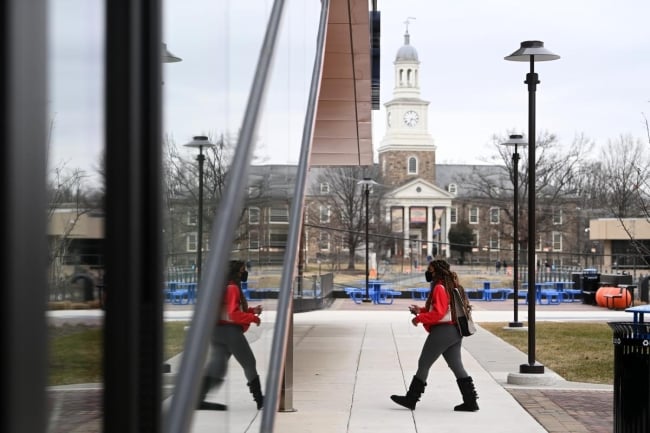You have /5 articles left.
Sign up for a free account or log in.

A minor seems to be linked to most of the threats made against HBCUs this year, according to the FBI.
Katherine Frey/The Washington Post/Getty Images
A series of bomb threats that shook historically Black colleges and universities earlier this year was allegedly committed by one minor, according to an update from the Federal Bureau of Investigations on Monday. The minor is reportedly being monitored and is “under restrictions.” Some HBCU leaders, who have been clamoring for information about possible perpetrators for months, remain frustrated by the lengthy investigation process.
More than 50 racially motivated threats of violence have been made against HBCUs and predominantly Black churches across the country since January, which the FBI has been investigating as hate crimes. No bombs were found, but the repeated threats caused widespread disruption on campuses, shutting down classes and campus activities and taxing the mental health of students, parents, faculty and staff members.
“Hate-fueled and racist threats of violence cause the victims real distress,” the update from the FBI reads. “These threats disrupt the learning environment and the education of college students, as well as other citizens. The FBI will not tolerate anyone trying to instill fear in any community, especially one that has experienced violence and threats of violence historically. The FBI will continue to vigorously pursue anyone responsible for these ongoing threats with help from our law enforcement partners at the federal, state, and local levels.”
FBI officials previously said that a group of minors appeared to be responsible for the first string of threats between Jan. 4 and Feb. 1, but after further investigation, they now suspect just one culprit was behind the threats. The agency’s update notes that there are “federal limitations for charging under-age perpetrators with federal crimes,” such as a hate crime. But state prosecutors have leveled other charges against the individual, unrelated to the threats to HBCUs, which has allowed the Department of Justice to “hold the minor accountable” and impose restrictions on the person’s online activities. The FBI can provide no identifying details because of the minor’s age, according to the update.
Tanya Washington Hicks, a law professor at Georgia State University and the parent of a sophomore at Morgan State University, one of the HBCUs threatened, said a minor can’t be prosecuted under federal law but can be prosecuted under state laws. The person’s underage status might also affect the length of a jail sentence, and the perpetrator would likely go to a facility for juvenile offenders, she said.
But bomb threats made by a minor are equally troubling as those made by adults, Washington Hicks said.
“If we look at the school shooting cases in K-12 spaces, minors can wreak just as much havoc and mayhem and destruction if they have access to weapons for adult use,” she said. “So there are greater protections for a minor, but the capacity of a minor to cause great harm is not mitigated by their youth.”
Carmen Walters, president of Tougaloo College in Mississippi, which was threatened in August, said it saddened her that a young person would make these threats.
“It’s very disappointing to know that we have young people who don’t value the importance of higher ed, whether it’s a historically Black college or not, and that this kind of foolery is happening in this day and age as we try to educate communities about coming together and being unified,” she said.
She said the threat to her campus was a trying ordeal.
“Getting a call at 4 o’clock in the morning saying that there’s a bomb threat … on your campus when you are responsible for hundreds of students, you’re responsible for facilities and technology and the community that’s around you, it’s a nerve-racking, heart-wrenching concern,” she said.
FBI officials are also in the process of investigating two other strings of threats made against HBCUs and other institutions, but these threats they believe “originated overseas.” One series of threats mainly targeted HBCUs, at least 19 institutions, from Feb. 8 to March 2. Another set of threats, which started in June, is “ongoing” and has targeted 250 colleges, including seven HBCUs, more than 100 high schools and two junior high schools.
FBI deputy director Paul Abbate said at least 30 of the FBI’s 56 field offices have been involved in the investigation, and “an immense amount of resources have been and continue to be dedicated to resolving these threats and holding those responsible accountable.” (This paragraph has been updated to correct the deputy director's first name.)
”This has included countless hours of dedicated work by FBI personnel and law enforcement partners on our counterterrorism, criminal and cyber investigative squads, and parallel efforts from our headquarters divisions to assist and support our field personnel on the front line,” he told HBCU student reporters at a briefing this week, according to a transcript of the briefing.
He stressed that the FBI has been in close communication with the affected parties and has “held numerous national level calls, some jointly with our partners at the Department of Homeland Security, to provide information, resources and updates on our investigative efforts to the most senior executive leaders and the security components of HBCUs, HBCs and HBIs.” He noted that FBI director Christopher Wray met with National Organization of Black Law Enforcement Executives in March; the FBI held a briefing with HBCU leaders, public safety directors and chiefs of police in September; and local agents worked directly with the leadership of affected institutions.
”We’re committed to ensuring that information and updates are flowing to all members of the communities affected and victims in particular,” he said.
Walters, who previously criticized the FBI for a lack of communication, said she’s thankful officials “got to the bottom of this” and their level of contact with HBCU leaders has markedly improved. She believes they took HBCU leaders’ complaints to heart. She said her campus chief of police had a meeting with local FBI agents on Tuesday and the campus now has a liaison to the nearby FBI field office.
“I think the information now is going to flow,” she said. “The communication is going to be much better, and I’m very, very happy about that.”
Other HBCU leaders, while gratified to receive more information, were still left disappointed by the investigative process.
“We’re relieved that the wheels of justice are beginning to turn,” said Lodriguez Murray, senior vice president of public policy and government affairs at the United Negro College Fund, which represents private HBCUs. “I’m still floored at the length of time—and almost nothing to make up for the sheer terror, unease, disturbance, cost of protection and the mental anguish experienced by faculty, students and staff simply because they chose to work at or attend a historically Black college or university.”
David Sheppard, chief legal officer and chief of staff at the Thurgood Marshall College Fund, an organization representing public HBCUs, said the latest findings seem like old news. Briefings last winter with the Department of Justice already revealed that FBI officials believed a group of minors to be involved, and they suspected one minor was the “lead person,” he said. He heard in a September briefing that the person’s home had been searched.
“The fact that it’s taken that long after that event happened to finally narrow in on this person is a little surprising, and particularly surprising given the FBI and the Justice Department have been adamant throughout that this is a top priority of the Justice Department and they’re throwing all their resources at it,” he said. “It just took a long time to get to a determination that this was the responsible party.”
He added that the agency’s communication with HBCU leaders “left something to be desired.” For example, while FBI offices may have worked with institutions locally, officials went months at a time without briefing HBCU leaders as a group about the investigation. He recognizes that the FBI isn’t at liberty to share granular details, but he would have preferred more regular updates. HBCU leaders also heard in a previous briefing that the FBI had to work with local law enforcement on the investigation, given the involvement of minors, but officials didn’t elaborate on what that meant.
Sheppard believes the level of communication didn’t match the gravity of the situation.
“It’s not an insignificant issue,” he said. “Anytime somebody, be they a minor or not, makes a threat to one of our institutions, it’s disruptive to campus activities, classes, and it’s problematic for every school that has encountered this issue. So, to have more communication about the issue on a regular basis would have been at a premium.”
Murray said he found out about the most recent FBI findings when a reporter from The Washington Post contacted him for comment. While members of the press, including HBCU student journalists, had a conference call with FBI officials on Monday, he said HBCU leaders were not included.
While he believes the Biden-Harris administration has been among the “best ever” for HBCUs, the Department of Justice and FBI have room to “improve their relationship with these threatened communities.”
“We’re a community that has been victimized, and the communication should’ve been, can be and must be better,” he said.
He hopes the perpetrator is penalized so that others are deterred from making similar threats to the institutions.
“I hope that the copycats and others who wish to strike terror into the lives of first-generation students who just want to attain higher education will be deterred from doing so because of the prosecution,” he said. “And I hope that whoever did this, no matter their age, sees the fullest extent of the law possible. Because this is serious, and the impacts and effects cannot be glossed over.”
Washington Hicks said while she’s grateful for the FBI’s work, she isn’t convinced HBCUs won’t continue to face threats as Black History month approaches, and she doesn’t want to take for granted that future threats will be unfounded. She wants to see more preventative measures to help HBCUs beef up security.
“I can’t help but wonder and worry what will happen this February,” she said. “It’s not like the rhetoric has died down or the tension has died down. In fact, since last February we seem to be in a more agitated state … with politics and our culture wars. I’m not encouraged by the existing climate, that in February we’ll be in a different place where people wouldn’t be as likely to make these kinds of threats. While I’m glad [the perpetrator] didn’t make good on [their] promises, what’s to stop the next person from going further than just issuing a threat?”









